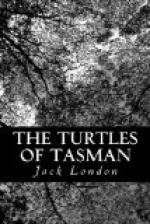“I’m good for a couple of weeks,” he spoke aloud.
“Maybe three,” he added, as he put the biscuits away.
Again he drew on his mittens, pulled down his ear-flaps, took the rifle, and went out to his station on the river bank. He crouched in the snow, himself unseen, and watched. After a few minutes of inaction, the frost began to bite in, and he rested the rifle across his knees and beat his hands back and forth. Then the sting in his feet became intolerable, and he stepped back from the bank and tramped heavily up and down among the trees. But he did not tramp long at a time. Every several minutes he came to the edge of the bank and peered up and down the trail, as though by sheer will he could materialise the form of a man upon it. The short morning passed, though it had seemed century-long to him, and the trail remained empty.
It was easier in the afternoon, watching by the bank. The temperature rose, and soon the snow began to fall—dry and fine and crystalline. There was no wind, and it fell straight down, in quiet monotony. He crouched with eyes closed, his head upon his knees, keeping his watch upon the trail with his ears. But no whining of dogs, churning of sleds, nor cries of drivers broke the silence. With twilight he returned to the tent, cut a supply of firewood, ate two biscuits, and crawled into his blankets. He slept restlessly, tossing about and groaning; and at midnight he got up and ate another biscuit.
Each day grew colder. Four biscuits could not keep up the heat of his body, despite the quantities of hot spruce tea he drank, and he increased his allowance, morning and evening, to three biscuits. In the middle of the day he ate nothing, contenting himself with several cups of excessively weak real tea. This programme became routine. In the morning three biscuits, at noon real tea, and at night three biscuits. In between he drank spruce tea for his scurvy. He caught himself making larger biscuits, and after a severe struggle with himself went back to the old size.
On the fifth day the trail returned to life. To the south a dark object appeared, and grew larger. Morganson became alert. He worked his rifle, ejecting a loaded cartridge from the chamber, by the same action replacing it with another, and returning the ejected cartridge into the magazine. He lowered the trigger to half-cock, and drew on his mitten to keep the trigger-hand warm. As the dark object came nearer he made it out to be a man, without dogs or sled, travelling light. He grew nervous, cocked the trigger, then put it back to half-cock again. The man developed into an Indian, and Morganson, with a sigh of disappointment, dropped the rifle across his knees. The Indian went on past and disappeared towards Minto behind the out-jutting clump of trees.
But Morganson conceived an idea. He changed his crouching spot to a place where cottonwood limbs projected on either side of him. Into these with his axe he chopped two broad notches. Then in one of the notches he rested the barrel of his rifle and glanced along the sights. He covered the trail thoroughly in that direction. He turned about, rested the rifle in the other notch, and, looking along the sights, swept the trail to the clump of trees behind which it disappeared.




